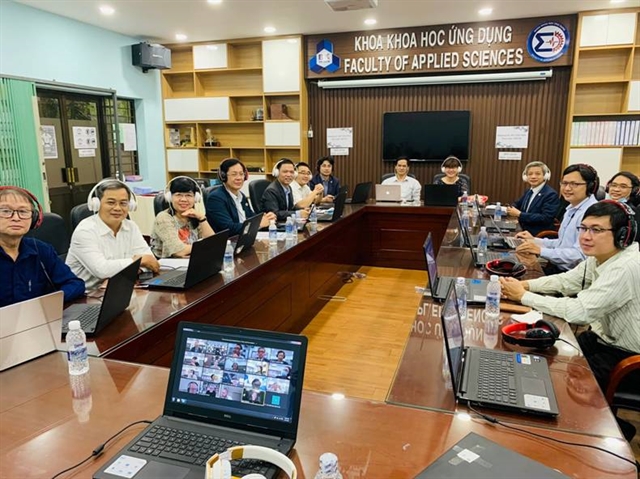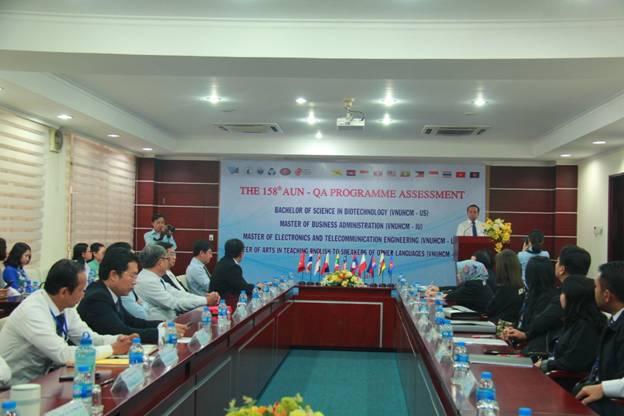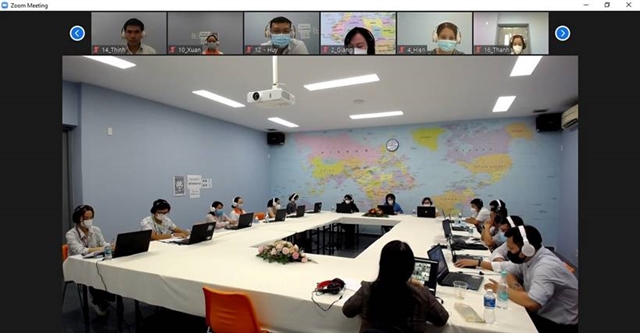 Society
Society

 |
| The HCM City University of Technology accredits the training quality of the natural resources and environment management programme according to ASIIN standards. — Photo courtesy of VNU-HCM |
HCM CITY — Throughout its 28-year journey of development, Việt Nam National University-HCM City (VNU-HCM) has constantly strived to meet international accreditation standards at different levels from training programmes to educational facilities.
The value and benefits of international accreditation and recognition for higher education are considered the key to improving VNU-HCM’s educational quality and contributing to raising the level of higher education in Việt Nam.
Nguyễn Quốc Chính, director of the Centre for Testing and Evaluation of Training Quality at VNU-HCM, said international accreditation not only helped the university improve training quality, but also learners benefit from an international standard education system.
“With a number of international accreditation standards like ABET, the certificates and qualifications of learners are recognised globally, helping them more easily access the international labour market,” he said.
 |
| The Việt Nam National University-HCM City accredits training programmes according to AUN-QA standards in 2019. — Photo courtesy of VNU-HCM |
Vũ Hải Quân, VNU-HCM's chancellor, said the university had many outstanding achievements this year, which affirm its position domestically and internationally.
It maintained its position in the top 1000 of the world's universities and reached the 167th position of best universities in Asia by the UK educational organisation Quacquarelli Symonds (QS).
The petroleum engineering major of the HCM City University of Technology under VNU-HCM is not only ranked first in the country but also ranked in the 51-100 group by the 2023 QS World University Rankings by Subject.
This is the highest position of VNU-HCM since joining this ranking, and represents the quality of Việt Nam’s higher education system.
In October last year, VNU-HCM was one of three Vietnamese universities listed in QS Sustainability 2023 as compiled by British education company Quacquarelli Symonds (QS).
Accordingly, the university was placed in the 601+ group.
The QS Sustainability 2023 ranking criteria are classified into three groups: Sustainable Institutions, Sustainable Education and Sustainable Research.
In the last year only, VNU-HCM had 33 training programmes meeting international standards, including 12 programmes meeting AUN-QA standards, eight programmes meeting CTI standards, three programmes meeting AQAS standards, nine meeting ASIIN standards, and one programme meeting FIBAA standards.
Among university members of VNU-HCM, the HCM City University of Technology led in the number of training programmes meeting international accreditation standards from the prestigious global organisations of CTI, AQAS and ASIIN, with 21 programmes.
The remaining 12 programmes met AUN-QA standards, including those of the HCM City University of Social Sciences and Humanities, the HCM City University of Information Technology and An Giang University, with two, two, and eight programmes, respectively.
As of the end of last year, VNU-HCM had 2,400 articles published in international scientific journals, according to the scientific publication database on the Scopus system under the publisher Elsevier.
 |
| The HCM City University of Technology accredits training programmes according to FIBAA standards. — Photo courtesy of VNU-HCM |
Diversification of accreditation for a multi-dimensional view
VNU-HCM leads the country with 119 programmes meeting accreditation standards, including 116 programmes meeting international accreditation standards from ABET, ASIIN, FIBAA, AUN, CTI and AQAS, in various fields such as engineering, sciences and economics.
According to Nguyễn Quốc Chính, each set of standards has different orientations and approaches.
The AUN-QA standards are highly general, focusing on the quality assurance system to build a solid foundation, without in-depth assessment for each specific specialty.
Meanwhile, some accreditation standards such as ABET and ASIIN focus more deeply on specific fields. For example, ABET specialises in engineering, FIBAA specialises in economics and management, and ASIIN specialises in natural sciences.
International integration of education quality is a long standing aim that VNU-HCM has extensively pursued and carefully prepared for.
“The university aims to be among the leading higher education institutions in Asia. Therefore participating in accreditation according to international standards will help VNU-HCM to strengthen internationalisation,” he said.
Diversification of accreditation standards will help obtain information from many different sources. ABET experts are from the US, AUN experts from Asia, and HCERES and ASIIN experts from Europe.
“This will provide multi-dimensional suggestions and advice, helping promote better development,” he added.
To have more training programmes or educational institutions meet international standards, it was necessary to build an internal quality assurance system with clear and specific procedures and regulations, Chính said.
The design of training programmes, implementation of teaching and learning methods, and testing and evaluation must meet standards.
The university must be an effective management system, ensuring that there are enough resources in terms of people, facilities and finances.
It had made basic preparations to meet the requirements for quality assurance and accreditation, which had been clearly reflected in its strategic plan for training and scientific-technological development, as well as international cooperation programmes. — VNS




